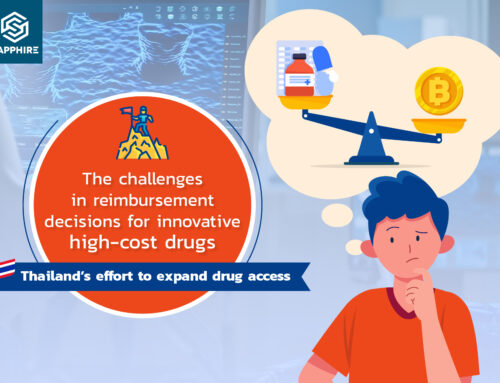In a constantly evolving world of healthcare, staying updated and informed about new developments and innovations is essential. The Health Intervention and Technology Assessment Program (HITAP), a Health Technology Assessment (HTA) organisation in the Ministry of Public Health, Thailand, had the opportunity to participate in the Health Intervention and Policy Evaluation Research (HIPER) Symposium 2024, held on 20-22 March 2024 in Singapore. Under the theme of addressing key challenges and advancements in HTA practice and policy, the symposium brought together esteemed experts and stakeholders from across the healthcare ecosystem.
Organized by the Saw Swee Hock School of Public Health at the National University of Singapore (SSHSPH NUS), this symposium provided a platform for thought-provoking discussions and knowledge-sharing on critical issues and advancements in Health Technology Assessment (HTA) practice and policy. With a diverse line-up of speakers from Ministries of Health and HTA practitioners from the Asia Pacific region, the event aimed to equip participants with the tools and insights necessary to contribute to the HTA process effectively. It also served as a platform where the exchange of ideas and best practices took center stage.
The following key takeaways from the symposium highlight the most pressing concerns and innovative approaches shaping the future of healthcare delivery and policy evaluation.
- Early Health Technology Assessment and its Potential Value: HTA plays a crucial role in evaluating medical innovations and their potential value propositions at the earliest stages of development. The approach known as Early HTA, can guide research and development efforts, potentially saving time and resources. This proactive approach emphasizes that it is never too early to evaluate technology, as waiting until later stages can lead to missed opportunities or challenges that arise when it is too late to make significant adjustments.
- Importance of Evidence-Based Decision-Making and Stakeholder Collaboration: Evidence-based decision-making and continuous improvement are critical for achieving better patient outcomes and cost-effective healthcare delivery. Transparency in pricing and the cost of innovation facilitates discussions on affordability and accessibility. Collaboration among stakeholders, including policymakers, healthcare professionals, and innovators, is essential for driving meaningful impact on healthcare delivery and patient outcomes. Open communication and engagement of diverse perspectives can help prioritize safety, efficacy, and patient acceptance in the development and adoption of new technologies and are important for successful healthcare innovation.
- Maximizing Healthcare Efficiency through AI Integration and Community Engagement: Enhancing healthcare efficiency through the integration of Artificial Intelligence (AI) and active community engagement is essential. This involves leveraging advanced technologies like AI to address rising healthcare costs, particularly among aging populations. Collaborative approaches, technological integration, and the use of data-driven methods are essential for improving patient outcomes while effectively managing expenses. Overcoming resistance among healthcare professionals to AI adoption requires dedicated efforts in education, training, and fostering open dialogue to address concerns. Implementing AI in healthcare demands comprehensive approaches and encompassing policy.
Concluding thoughts:
The HIPER Symposium shed light on critical aspects of healthcare policy, technology assessment, and collaborative approaches in the sector. It provided insightful perspectives on the relationship between health expenditure and life expectancy, the institutionalization of HTA in various countries, and strategies for successful implementation strategies and challenges in healthcare innovation. The symposium emphasized the importance of continued collaboration, knowledge-sharing, and learning from successful implementations for driving positive change in global healthcare systems. Moving forward, the symposium stressed the need for stakeholder engagement, innovative methodologies, and continuous progress monitoring to achieve improved healthcare outcomes for all.



